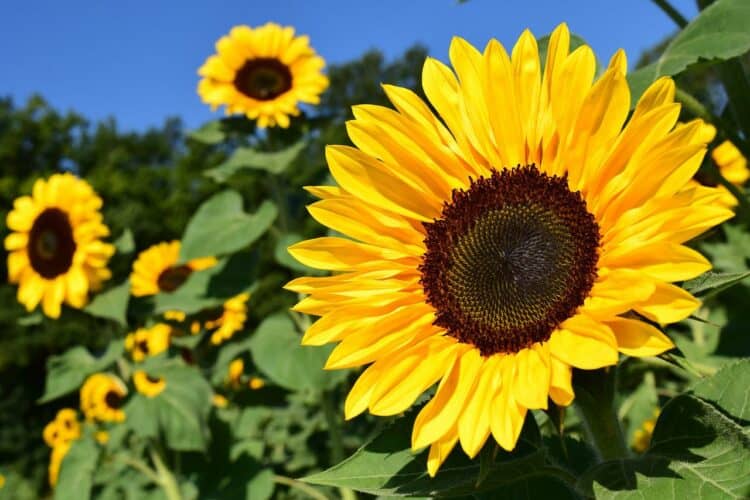Sunflowers are beautiful flowers that are part of the daisy family. They add color to any landscape, and even though yellow is the common color, they also come in brown, red, maroon, orange, and red. If you have a cat and just noticed it ate a little of the plant, you might be curious about whether you should be worried. Is a trip to the vet necessary? Is it a medical emergency?
Take a breath and relax. Luckily, sunflowers are non-toxic to cats. With that said, you’ll still want to monitor your cat because, even though they are non-toxic, they could cause minor tummy upset for your kitty. If you notice your cat displaying any kind of stomach issue, such as vomiting or diarrhea, you may want to check with your vet. However, your cat should be just fine, especially if it only had a little nibble.
What Plants Should I Avoid?
While sunflowers are generally safe to have around your home, some plants and flowers are not. It’s wise to know beforehand so that you can avoid purchasing certain plants to be on the safe side. Here are some plants to avoid:
- Azaleas
- Lilies
- Oleander
- Sago Palm
- Tulips
- Aloe
- Adam-and-Eve
- Branching Ivy
- Buttercup
- Daffodils
- Yew
Of course, this isn’t an exhaustive list of poisonous plants and flowers, but if ever in doubt, you can always check the ASPCA for detailed information.
Which Plants and Flowers Are Safe?
Cats are obligate carnivores, meaning they need mostly protein in their diets. While some plants are safe for them to eat, they don’t need plant matter. A typical diet for cats consists of protein, fats, amino acids, fatty acids, carbohydrates, and minerals. Nonetheless, some particular plants and flowers are safe to have in and around your home.
- African Daisies
- Ball fern
- Baby Rubber Plant
- Bamboo
- Wild Hyacinth
- Bottlebrush
- Carrot Flower
- Crepe Myrtle
- Impatience Plant
- Orchid
- Money Tree
- Pot Marigold
- Rose
- Zinnia
These are just a few plants and flowers that are safe. As we’ve mentioned, ASPCA is an excellent resource, and always check with your vet if ever in doubt.
Final Thoughts
Now that you know sunflowers are safe, it’s still best to monitor your cat due to the stomach issues sunflowers can cause. If your cat nibbles on a sunflower here and there, there shouldn’t be any cause for alarm. If your cat ingests a lot of the sunflower, digestive problems could occur, including vomiting and diarrhea. It’s best not to let your cat ingest sunflower for two reasons: they don’t need it in their diet, and while non-toxic, it could still cause stomach upset.
The main focus of this article is to ease your mind in case your cat ate a sunflower, but that doesn’t mean you should let them nibble on it anytime they want. If your cat likes an occasional treat aside from its normal food, it’s okay to feed them certain fruits, but keep it at a minimum.
Featured Image Credit: Pixabay














